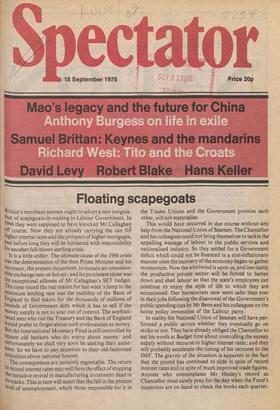Floating scapegoats
Britain's merchant seamen ought to adopt a new insignia : that of scapegoats-in-waiting to Labour Government. In 1966 they were supposed to have knocked Mr Callaghan off course. Now they are already carrying the can for higher interest rates and the prospect of higher mortgages, and before long they will be lumbered with responsibility for another full-blown sterling crisis.
It is a little unfair. The ultimate cause of the 1966 crisis was the determination of the then Prime Minister and his successor, the present incumbent, to sustain an unsustainable exchange rate on hot air; and its proximate cause was the exceptional silliness of Mr Callaghan's SET budget. ihis time round the real reason for last week's jump in the toinimum lending rate was the inability of the Bank of 4gland to find takers for the thousands of millions of Pounds of Government debt which it has to sell if the Inoney supply is not to soar out of control. The sophisticated men who run the Treasury and the Bank of England would prefer to forget about such irrelevancies as money. But the International Monetary Fund is still controlled by square old bankers who do worry about money : and unfortunately we shall very soon be seeking their assistance. So we have to pay attention to their old-fashioned Prejudices about national finance.
The consequences are certainly regrettable. The return to record interest rates may well have the effect of stopping the tentative revival in manufacturing investment dead in Its tracks. This in turn will mean that the fall in the present level of unemployment, which those responsible for it in the Trades Unions and the Government promise each other, will not materialise.
This would have occurred in due course without any help from the National Union of Seamen. The Chancellor and his colleagues could not bring themselves to tackle the appalling wastage of labour in the public services and nationalised industry. So they settled for a Government deficit which could not be financed in a non-inflationary manner once the recovery of the economy began to gather momentum. Now the whirlwind is upon us, and inevitably the productive private sector will be forced to batten down and shed labour so that the state's employees can continue to enjoy the style of life to which they are accustomed. Our bureaucrats now seem safer than ever in their jobs following the disavowal of the Government's public spending cuts by Mr Benn and his colleagues on the home policy committee of the Labour party.
In reality the National Union of Seamen will have performed a public service whether they eventually go on strike or not. They have already obliged the Chancellor to eat his words at Budget time about controlling the money supply without recourse to higher interest rates ; and they will probably accelerate the timing of his recourse to the IMF. The gravity of the situation is apparent in the fact that the pound has continued to slide in spite of record interest rates and in spite of much improved trade figures. Anyone who contemplates Mr Healey's record as Chancellor must surely pray for the day when the Fund's inspectors are on hand to check the books each quarter.





































